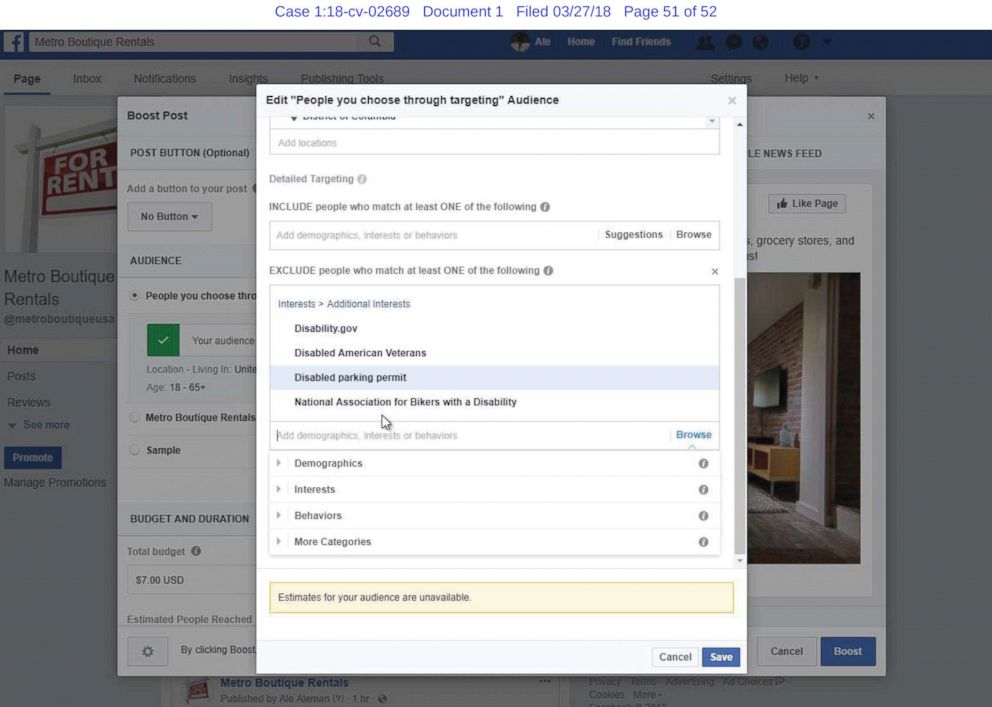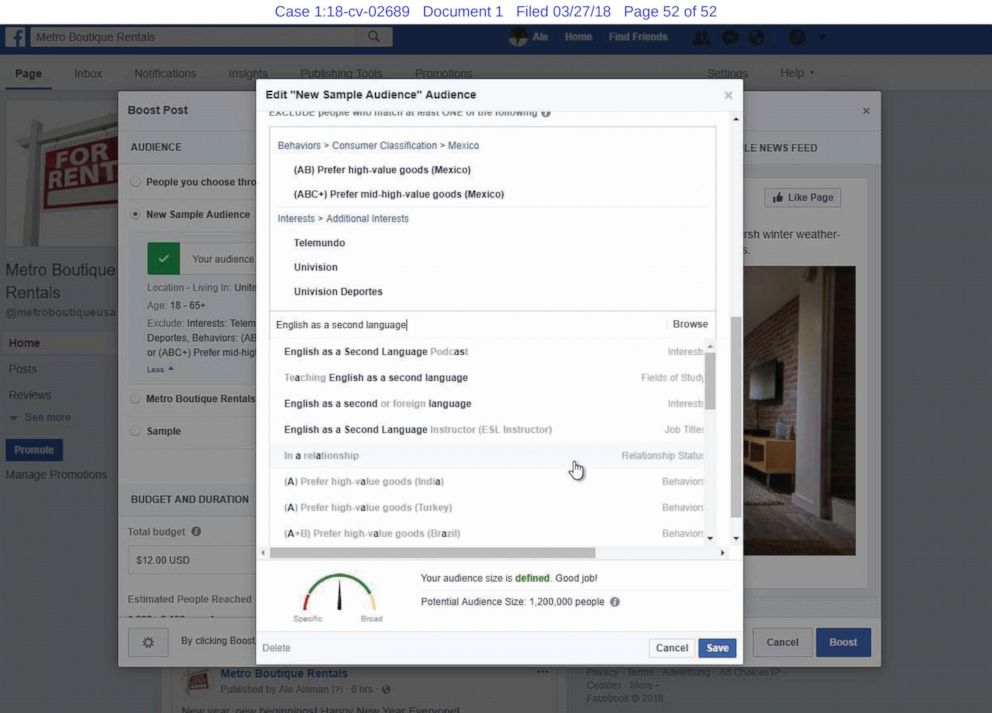Housing groups say Facebook ads still allow discrimination in new lawsuit
Facebook says the lawsuit is without merit and that it does not discriminate.
WASHINGTON, D.C. -- Facebook is facing yet another legal challenge this week — this time over ads that advocacy groups claim discriminate against people looking to rent an apartment or buy a house.
Housing advocacy groups, including the National Fair Housing Alliance, filed a lawsuit in federal court this week alleging that Facebook has not done enough to prevent anyone buying housing ads from discriminating against protected groups, despite Facebook's repeated promises to address the issue.
The nonprofit investigative news organization ProPublica reported in 2016 that Facebook's advertising platform gives companies the option to exclude who would see ads based on the users' race. The reporters were able to purchase an ad targeted to Facebook users who were house hunting and were able to exclude anyone with an "affinity" for African-American, Asian-American or Hispanic people.
The federal Fair Housing Act makes it illegal to refuse to rent or sell someone a house because of their race, gender, sexual orientation, religion, or other protected factors.
The law specifically says that it is illegal to place an advertisement to rent or sell a property that "indicates any preference, limitation, or discrimination based on race, color, religion, sex, handicap, familial status, or national origin, or an intention to make any such preference, limitation, or discrimination."
Shortly after the ProPublica report, Facebook said in a blog post that its "ethnic affinity" option gave brands a way to reach multicultural audiences with relevant ads and that its policies did not allow using that option in a discriminatory way. However in response to concern that it was being misused the company would create a tool to disable that option for certain ads, including those related to housing.
Last year Facebook announced that it had updated its ad policies to make it more clear that some ads could not exclude the multicultural groups and that it was testing technology that would not allow advertisers to exclude those multicultural groups from seeing ads for housing, jobs, or credit opportunities.
ProPublica reported again in November 2017 that Facebook still approved housing ads that excluded groups protected under the Fair Housing Act such as African-Americans or people who indicated an interest in wheelchair ramps. Facebook Chief Operating Officer Sheryl Sandberg said after that report that Facebook would disable the option to exclude multicultural groups, in a letter to the Congressional Black Caucus. The company also told ProPublica in a statement that its enforcement system failed for those specific ads but that they should have triggered the review process.
Now multiple groups that advocate for civil rights in housing say the social media giant is still violating the Fair Housing Act more than two years after those initial reports, even after it has implemented enforcement systems to prevent ads from discriminating on the basis of race.
"With almost 2 billion users, Facebook customizes the audience for its millions of advertisers based on its vast trove of personalized user data. After being warned repeatedly about its discriminatory advertising practices, Facebook continues to use this data to deny people access to rental housing and real estate sales ads because of their sex and family status," the National Fair Housing Alliance said in a statement.
A Facebook spokesperson pushed back against the lawsuit in a statement to ABC News.
"There is absolutely no place for discrimination on Facebook. We believe this lawsuit is without merit, and we will defend ourselves vigorously," the spokesperson said in a statement.
Although Facebook says it took steps to prevent discrimination related to users' race, the NFHA and other groups filing the lawsuit say they found the advertising options still allow companies to exclude other protected groups from seeing ads, such as families with children, people with interests such as "Disabled parking permit," or "English as a second language."

The NFHA is joined in the lawsuit by fair housing groups based in New York City, Miami, and San Antonio.
In one example cited in the lawsuit, the groups say they created a fake realty company and submitted housing advertisements to Facebook and paid to promote the ad in Washington, D.C. They allege that Facebook then allowed them to exclude users who listed "Telemundo," "English as a second language," and "Univion Deports" from seeing the ad.

In another example, the lawsuit says the groups were allowed to exclude people with children from seeing an ad to rent an apartment.
The lawsuit says that by limiting who can see ads on Facebook the platform is stealthier than if ads were posted publicly or in a newspaper where anyone could see it, saying that "Facebook's algorithms can ensure exclusion and deny access to housing."
The groups say this discrimination is even more significant because this year is the 50th anniversary of the Fair Housing Act.



